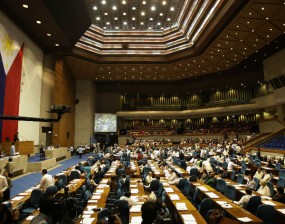Marathon hearings pay off for P2.6-T budget in House
MANILA, Philippines—The House of Representatives passed the proposed P2.6-trillion national budget for 2015 on second reading at a little before midnight on Friday, following two weeks of marathon deliberations.
Speaker Feliciano Belmonte Jr. commended the chamber for what he said was the “resurgence of the legislative will of budget oversight” as seen from the “spirited and incisive debates” on the floor.
“This brings us closer to ensuring the enactment of the 2015 budget law before the end of the current fiscal year so that the dangers of a reenacted budget will not deprive our people of the services they need,” Belmonte said.
The majority succeeded in getting the Malacañang-proposed budget approved despite opposition from the minority and independent blocs, including one member who had raised the specter of a reenacted budget by invoking the lack of a quorum on several occasions. This led to sessions lasting till the wee hours.
The House goes on a three-week break starting this weekend, after which it is expected to pass the measure on third reading on Oct. 20 or 21, Belmonte told reporters after the session.
Biggest allocations
Article continues after this advertisementHe said it was important to ensure that the 2015 expenditure program would be enacted by Congress before Jan. 1, 2015, to avoid a reenacted budget law.
Article continues after this advertisementThe departments which received the biggest allocations were: Department of Education, P365 billion; Department of Public Works and Highways, P300.5 billion; Department of National Defense, P144 billion; Department of Interior and Local Government, P141.4 billion; Department of Social Welfare and Development, P109 billion; Department of Health, P102.2 billion; Department of Agriculture, P88.8 billion; Department of Transportation and Communications, P59.5 billion; Department of Environment and Natural Resources, P21.3 billion; and the judiciary (Supreme Court), P20.3 billion.
“This chamber has suffered greatly in the past months but we have shown today that we are public servants first and last and that is what counts to everybody,” Belmonte told the chamber, alluding to the heavy criticism leveled at the House over the congressional pork barrel scam and Malacañang’s Disbursement Acceleration Program (DAP), whose biggest beneficiaries were senators and congressmen.
Bayan Muna Rep. Neri Colmenares delivered the traditional “turno en contra” speech expressing the minority’s opposition to the passage of the proposed 2015 budget, which he characterized as providing President Aquino with the largest pork barrel.
Huge pork barrel
“The worst thing about this budget is that it turned the proposed 2015 budget into a huge pork barrel for Mr. Aquino. More or less P958-billion in lump-sum discretionary funds are at the discretion of the President or the executive, according to Ibon Philippines,” he said.
In spite of the Department of Budget and Management’s claim that lump-sum funds accounted for only 1.8 percent, or P48.1 billion, of the budget, many items amounting to hundreds of billions of pesos were inserted throughout the budget, Colmenares said.
These include P61.3 billion in budgetary support to government-owned and -controlled corporations, P33.1 billion in assistance to local government units; P30 billion for a risk management program; P20 billion for infrastructure and social programs; P123 billion in unprogrammed funds; P118 billion in miscellaneous personnel benefit funds; P20.9 billion in the grassroots participatory budgeting, and P7.3 billion for the Pamana program.
Aside from savings
Colmenares said Mr. Aquino would have control over the P148 billion Malampaya Fund, P21.2 billion in Special Accounts, and P29.5 billion in off-budget accounts, including the motor vehicles user’s charge (also known as the road user’s tax), and the President’s Social Fund sourced from the state gaming and lottery agencies.
“This is aside from the ‘savings’ from 2014 that is estimated at P251 billion that will turn into lump-sum discretionary funds under the President,” he said.
Colmenares had been angered by the Malacañang move to change the definition of “savings,” to circumvent the decision of the Supreme Court in July striking down the DAP.
Under the new definition proposed by the DBM, savings may now be declared upon the “discontinuance or abandonment of a programmed project for a justifiable cause at any time during the validity of [the] appropriation.”
It omits the word “final” before “abandonment” from previous government definitions, meaning the President may declare savings even when a project had not been totally scrapped.
In voiding the DAP, the Supreme Court struck down the executive branch practice of declaring savings from unreleased appropriations and using unprogrammed or standby appropriations.
It ruled that savings and standby appropriations could be declared only at the end of the fiscal year.
RELATED STORIES
‘Pork’-less 2015 national budget amounts to P2.6T
